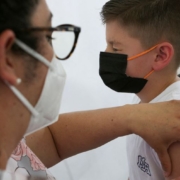Pfizer Inc. on April 29 said a large trial found that the company’s COVID-19 oral antiviral treatment Paxlovid was not effective at preventing coronavirus infection in people living with someone infected with the virus.
Pfizer Inc. said on April 28 the company would open the first U.S. trial sites for its experimental gene therapy for a muscle-wasting disorder, after the Food and Drug Administration lifted the regulatory agency’s hold on a late-stage study.
Pfizer Inc. and the company’s partner BioNTech SE said on April 26 that they had submitted an application to the U.S. health regulator for the authorization of a booster dose of their COVID-19 vaccine for children aged 5 to 11 years.
U.S. President Joe Biden’s administration is aiming to expand access to COVID-19 oral antiviral treatments like Pfizer Inc.’s Paxlovid by doubling the number of locations at which they are available, the White House said on April 26.
Pfizer said on April 22 the company was voluntarily recalling five batches of Accupril blood pressure tablets after finding elevated levels of a potential cancer-causing agent in the medicine.
Worldwide demand for Pfizer Inc.’s oral COVID-19 antiviral treatment Paxlovid has been unexpectedly light due to complicated eligibility requirements, reduced testing and potential for drug interactions, a Reuters review of data and interviews with experts found.
Pfizer Chief Executive Albert Bourla said on April 13 that the company could possibly develop a new vaccine that protects against the Omicron variant as well as older forms of COVID-19 by autumn.
Pfizer Inc. said on April 11 that Lowe’s Cos Inc Chief Financial Officer David Denton would succeed company veteran Frank D’Amelio as the U.S. drugmaker’s finance chief.
Pfizer boosts respiratory drug portfolio with ReViral purchase April 7, 2022 By Bhanvi Satija April 7 (Reuters) – Pfizer Inc (PFE.N) said on Thursday it would buy privately-held ReViral Ltd […]
Lexicon, BridgeBio, Esperion, Pfizer, More Celebrate Wins at 71st ACC Meeting
AstraZeneca, BioSpace, Cholesterol, Clinical Data, Clinical Trial Endpoints, Elevated Low-Density Lipoprotein Cholesterol (LDL-C), Heart Attacks, Heart Failure with Reduced Ejection Fraction (HFrEF), Pfizer, Primary Endpoints, R&D, Regeneron Pharmaceuticals, Sanofi, Small-Interfering RNA (siRNA) Class, Strokes, TTR Amyloidosis (ATTR)The 71st annual American College of Cardiology’s Scientific Session saw several wins – and some “mehs” led by some of biopharma’s largest companies, according to BioSpace.

 Reuters
Reuters Reuters
Reuters


